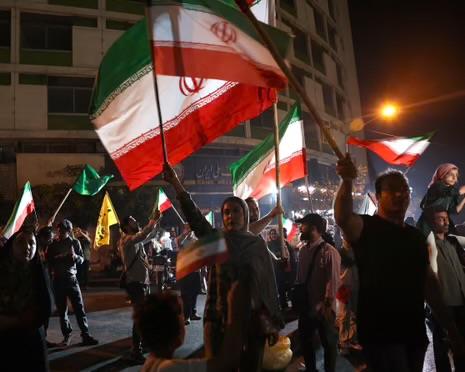In a surprise move, US President Donald Trump announced a ceasefire between Iran and Israel early Tuesday, but the agreement is already showing signs of strain, with both sides accusing each other of violating the terms of the truce. The ceasefire, which officially took effect at 7 a.m. local time in Jerusalem, was brokered by Trump following a series of intense diplomatic efforts. However, the fragile peace was short-lived, as Israeli cities, including Beersheba, came under rocket fire, killing at least four civilians. In response, the Israeli military launched strikes on Iranian targets, including Revolutionary Guard facilities, defense sites, and locations near Tehran suspected of housing nuclear infrastructure.
A Delicate Balancing ActThe situation remains volatile, with both sides trading accusations of truce violations. Trump, writing on his Truth Social platform, urged Israel to immediately halt its bombardment, saying, "Bring your pilots back at once." The US President reiterated that the United States is not pursuing regime change in Iran but remains firmly opposed to Tehran acquiring nuclear weapons. Speaking aboard Air Force One en route to a NATO summit in The Hague, Trump disclosed that Russian President Vladimir Putin had contacted him offering to mediate the crisis. This unexpected development highlights the complexity of the situation and the need for a concerted international effort to prevent further escalation.
Behind the Scenes: Qatar's Key Mediating RoleReuters confirmed that Qatar played a crucial mediating role in brokering the ceasefire. A senior source revealed that Qatari Prime Minister Sheikh Mohammed bin Abdulrahman Al Thani engaged Iranian officials following a call from Trump, leading to Tehran's initial agreement to de-escalate. Iranian President Masoud Pezeshkian reportedly expressed regret over Monday's missile strike on the US Al Udeid airbase in Qatar, an incident Doha condemned as a serious violation of its sovereignty.
Regional RepercussionsThe crisis has far-reaching implications for the region. Egyptian President Abdel Fattah Al-Sisi expressed Cairo's full support for Qatar during a phone call with Emir Tamim bin Hamad Al Thani, commending Doha's air defense response and diplomatic posture. Qatar summoned the Iranian ambassador in Doha and filed a complaint with the UN Security Council, warning of a "grave escalation" and asserting its right to respond under international law. In a related development, drone attacks on Tuesday morning targeted installations affiliated with the US-led coalition in Iraq. Although no casualties were reported, Iraqi security sources told Al-Araby Al-Jadeed newspaper that the strikes were likely part of Iran's response to recent US attacks on Iranian nuclear facilities.
A Precarious FutureAs the situation remains fluid, one thing is clear: the road to lasting peace in the region is fraught with challenges. The Trump-brokered ceasefire, while a welcome development, is only the first step in a long and complex process. The international community must continue to exert pressure on both sides to adhere to the agreement and work towards a more permanent solution. In the coming days and weeks, the world will be watching closely to see if this fragile peace can hold. One misstep could have disastrous consequences, but if successful, it could pave the way for a more stable and secure Middle East.
